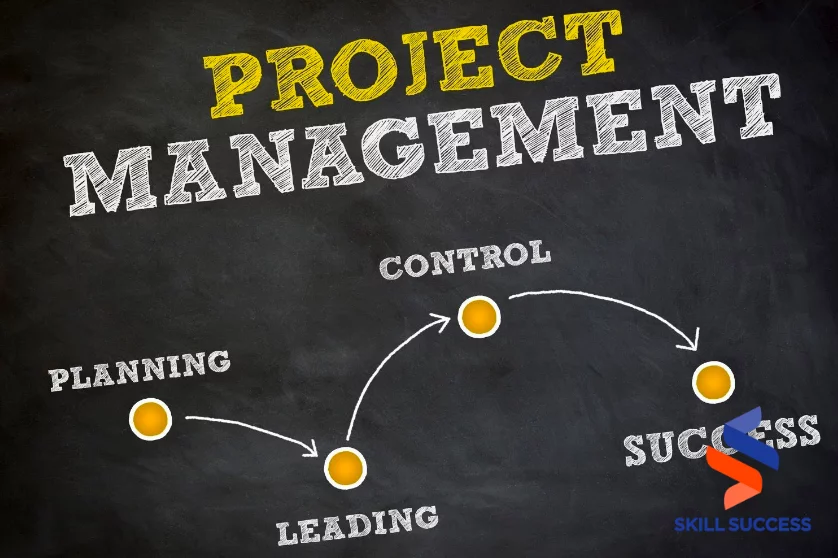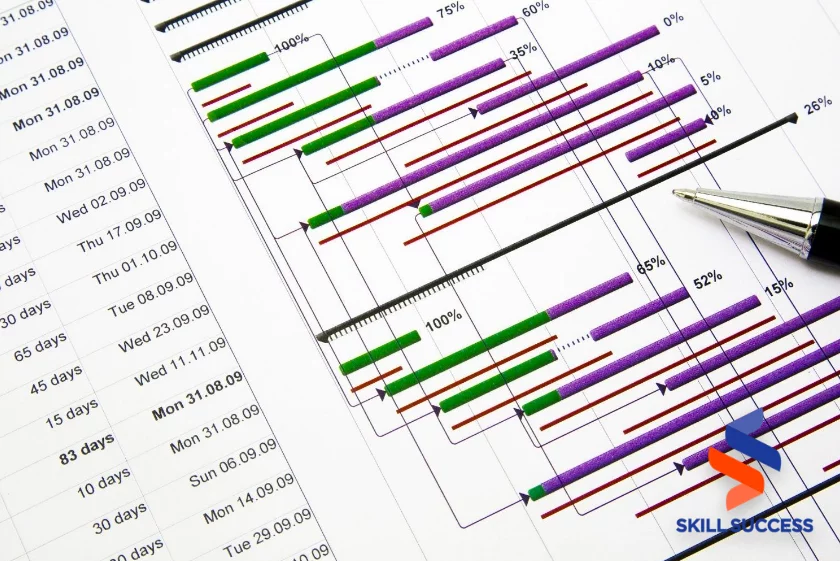Project management has become an essential skill in the business world. It is the process of organizing and managing resources to achieve specific goals. Whether you're an entrepreneur just starting out, or you're looking to improve your career prospects, learning how to manage projects effectively is key.
It is a vital skill for any business, but it can be tricky to learn. Regardless of your position or project, having a firm understanding of project management principles and practices will give you the ability to successfully deliver on time and within budget.
Project management might seem like a daunting task, but with the right tools and courses, it can be easy to get started. This guide provides an introduction to project management for beginners, as well as recommended courses to get started.
Whether you're just starting out or looking for a refresher, these resources will help you develop the skills needed to manage projects like a pro.
What is a project?
A project is an undertaking with a specific start and endpoint that is undertaken to achieve a particular goal. Projects are typically managed by a project manager and may involve a team of individuals working together to complete the project.
Projects often have tight deadlines and may require work to be completed quickly to meet the deadline. This can often mean that projects are completed under pressure and may require overtime or extra resources to be completed on time.
Projects can be large or small and can range from simple tasks such as painting a room to more complex undertakings such as building a new home. No matter the size or complexity of the project, there are a few key elements that all projects share.
Every project has a purpose or goal that it is trying to achieve. This could be something as simple as painting a room, or as complex as building a new home. Without a clear purpose, it can be difficult to determine if a project is successful. Every project also has a timeline, which is the amount of time that the project is expected to take from start to finish.
This timeline can be short, such as a few hours, or it can be long, such as several months. Having a timeline helps to ensure that the project stays on track and is completed within the allotted time. Every project also has a budget, which is the amount of money that is available to complete the project.
Why is project management important?
Project management is important because it helps to ensure that projects are completed on time, within budget, and to the required quality standards. Good project management also helps to improve communication and coordination between all those involved in a project, including the client, contractors, and other stakeholders.
An effective project manager can make the difference between a successful project and a failed one. They are responsible for ensuring that all aspects of the project are properly planned, coordinated, and executed. A good project manager will also have strong communication and interpersonal skills, as well as the ability to effectively manage risks.
Project management is thus a critical function in any organization that undertakes complex projects. It is essential to ensure that these projects are completed on time, within budget, and to the required quality standards.
There are many different project management methodologies, but all share the same basic goal: to ensure that projects are completed successfully. The most popular methodology is known as the PMBOK (Project Management Body of Knowledge). This approach outlines a specific process for managing projects, from initiation through to closure.
While each of these has its unique features, they all share the same basic goal of helping organizations to complete projects successfully. Project management is thus an essential function in any organization that undertakes complex projects.
What are the common tools used in project management?
1. Communication tools
To effectively manage a project, it is important to choose the right tool for the job at hand. Face-to-face meetings are often the best way to communicate with team members and stakeholders. They allow for immediate feedback and allow all participants to see body language and facial expressions.
Video conferencing is similar to teleconferencing, but with the added benefit of being able to see each other. This can be helpful for team members who are located in different time zones or who have difficulty hearing on the phone.
Email is a quick and easy way to send information to team members and stakeholders. However, it can be easy to miss important details in an email, and it is not always the best tool for larger projects.
2. Scheduling tools
There are a variety of scheduling tools available to project managers, each with their own advantages and disadvantages. The most popular scheduling tools include Microsoft Project, PERT charts, Gantt charts, and critical path analysis. Microsoft Project is a popular scheduling tool that offers a variety of features and capabilities.
However, it can be expensive and complex to use, making it best suited for larger projects. PERT charts are a popular scheduling tool for smaller projects. They are less expensive and easier to use than Microsoft Project, but they do not offer as many features and capabilities. Gantt charts are a popular scheduling tool for both small and large projects.
3. Tracking tools
Microsoft Project is a popular project management software application that can be used to track project tasks, resources, and timelines. However, it can be expensive to purchase and can be challenging to learn how to use effectively. Gantt charts are a popular project management tool that can be used to visualize project tasks and timelines.
However, they can be difficult to create and maintain. Earned value management systems are a popular project management tool that can be used to track project progress and costs. However, they can be complex to set up and use.
4. Risk management tools
This is one of the most important tools used in project management, as it helps to manage and monitor all aspects of a project in one place. There are many different types of free project management software available, so it is important to choose one that will suit your specific needs.
In order to effectively manage risks, managers need to use risk management tools. Risk management tools help managers identify and assess risks, as well as develop plans to mitigate those risks. There are a lot of common risk management tools in project management, such as project management software, risk registers, and change logs.
5. Budgeting tools
Budgeting is one of the most important aspects of project management, as it allows you to track your project's finances and ensure that you are staying within your budget. There are a variety of different budgeting tools that you can use to help manage your project's finances, and each has its advantages and disadvantages.
One of the most popular budgeting tools is Microsoft Excel. Excel is a powerful spreadsheet program that can be used to track your project's finances. One of the advantages of using Excel for budgeting is that it is very user-friendly and easy to use.
However, one of the disadvantages of using Excel for budgeting is that it can be difficult to keep track of all the different aspects of your project's finances.
What is a project manager?
A project manager is a professional in the field of project management. They have the responsibility of ensuring that a project is completed on time, within budget, and according to specifications. Project managers are responsible for all aspects of a project, from planning and scheduling to execution and completion.
They must be able to effectively communicate with all members of a project team, as well as with stakeholders, to ensure that the project is completed successfully. An effective project manager must also be able to effectively manage risks and issues that may arise during a project.
In addition, a project manager must be able to monitor the progress of a project and make necessary adjustments to ensure that the project remains on track. A project manager is an essential member of any project team, and the success of a project depends heavily on the ability of the project manager to effectively manage all aspects of the project.
Project management is a complex and challenging field, and project managers must have the necessary skills and knowledge to be successful. If you are interested in becoming a project manager, there are many resources available to help you learn more about this exciting profession.
Recommended courses in project management 101
1. Project Management: Roles And Responsibilities In A Project

In this course, you will learn about the different roles and responsibilities of a project manager. You will also learn about the different stages of a project, and how to manage each stage. This course is suitable for anyone who wants to learn about project management.
It is also suitable for those who are already working as project managers, and who want to improve their skills. This course is delivered through a combination of video lectures, readings, and quizzes.
You will learn how to create a project schedule, and how to allocate resources to the different tasks in the project. You will also learn how to monitor and control the progress of the project. By the end of this course, you will have a good understanding of what is required of a project manager and be able to apply these skills to your projects.
Take this course2. Project Management Foundation Course

In this foundation course, you'll learn about the basics of project management. You'll become familiar with project management concepts and principles, and learn how to apply them in practice.
You'll also gain an understanding of the various project management tools and techniques that can be used to effectively manage projects. By the end of the course, you should have a good understanding of how to plan, execute, and monitor projects.
Additionally, you'll learn about the different project management methodologies and how to select the most appropriate one for your project. This course is designed for those who are new to project management, or for those who want to refresh their knowledge of the basics.
It will also be beneficial for those who are looking to prepare for a project management certification exam. Upon completion of this course, you'll be able to understand the basics of project management and the various project management concepts and principles.
Take this course3. PMP Project Management

In the PMP Project Management Course, you will learn how to successfully manage projects using the PMP framework. You will learn about the different aspects of project management, including planning, execution, monitoring and controlling, and closure.
You will also gain an understanding of the different tools and techniques that are used in each stage of the project management process. In addition, you will learn about the different principles of project management, including risk management, quality management, and change management.
You will also learn how to effectively communicate with project stakeholders and manage team dynamics. This course is designed for those who want to learn the basics of project management and prepare for the PMP Exam. The course covers all the knowledge areas of the PMP Exam and provides an ample opportunity to practice exam questions.
Take this course4. User Stories For Agile Scrum: Product Owner And Business Analysis

In this course, you will learn how to write user stories that can be used in the agile scrum. You will also learn about the product owner and business analyst roles, and how user stories fit into the agile process.
You will gain an understanding of common user story templates, and learn how to use them to write effective user stories. By the end of this course, you will be able to write user stories that are clear, concise, and easy to understand.
Additionally, you will have a strong understanding of the product owner and business analyst roles, and how user stories fit into the agile process. This course is perfect for anyone who wants to learn how to write user stories for agile scrum, or for anyone who wants to gain a better understanding of the product owner and business analyst roles.
Take this course5. Agile Project Management: Scrum Step By Step With Examples

In this Agile Project Management: Scrum Step By Step With Examples course, you will learn how to successfully implement the Scrum framework within your organization. This course is designed for those who want to learn how to use Scrum to increase their project management efficiency.
This course begins by providing an overview of the Scrum framework and its key concepts. You will learn about the Scrum roles, events, and artifacts, and how they all fit together to help teams work more effectively. You will also learn about common Scrum tools and techniques that can be used to further improve your team’s productivity.
By the end of this course, you will have a solid understanding of how to apply Scrum to your projects, and you will be able to start using Scrum to improve your team’s efficiency immediately.
Take this course6. Kanban: Productivity And Efficiency For Agile And Lean Project

This course is designed to give you a complete understanding of Kanban, from the basics right through to more advanced concepts. You'll learn how Kanban can be used to improve productivity and efficiency in an agile or lean project.
The course starts with a brief overview of Kanban, before diving into the details of how it works. You'll learn about the Kanban board and how to use it effectively, along with the Kanban cards and swim lanes. You'll also learn about some of the more advanced concepts in Kanban, such as WIP limits and Kanban metrics.
By the end of the course, you'll have a complete understanding of how Kanban can be used to improve the productivity and efficiency of your agile or lean project. You will also be able to apply Kanban to your organization or project.
Take this course7. Setting Up A Real World Project In JIRA

This course is designed to give you practical, hands-on experience of working with JIRA in a professional environment. You'll learn how to set up projects, track and manage tasks, work with team members, and more.
In this course, you'll learn how to set up a real-world JIRA project. You'll start by creating a project in JIRA and configuring it to fit your needs. Then, you'll add users and groups, set up permissions, and create workflows.
This course is geared toward those who are new to JIRA or don't have a lot of experience using it. By the end of this course, you'll have all the skills you need to set up and manage a JIRA project.
Take this course8. Project Management: Deliver On Time And Scrum Project Delivery

In this course, you will learn the necessary skills to deliver projects on time and within budget. You will also learn how to effectively utilize Scrum methodology in order to optimize project delivery.
This course is perfect for those who wish to learn more about project management and how to deliver successful projects. It will teach you the basics of project management, as well as specific strategies and techniques that you can use in order to deliver your projects on time and within budget.
By the end of this course, you will be able to understand what project management is and why it is important. You will learn the different phases of a project's lifecycle and how to create a project schedule.
Take this course9. Practical Project Management: Manage Your Next Project From Start To Finish

The course covers topics such as creating a project plan, setting milestones, assigning tasks, tracking progress, and dealing with risks and issues. By the end of the course, you will have the skills and knowledge necessary to successfully manage your next project.
This course is perfect for anyone who wants to learn how to manage projects effectively. Whether you’re a project manager, a business owner, or simply someone who wants to be better at managing projects, this course will give you the tools and techniques you need to succeed.
You will learn about the different types of projects, the project management process, and the key concepts of project management. You will learn about the different elements of a project plan, and you will learn how to create a schedule, set milestones, and assign tasks.
Take this course10. Project Management: Seven Reasons Why Projects May Fail

In the Project Management: Reasons Why Projects May Fail Course, you will learn about some of the most common reasons why projects fail. You will also learn how to avoid these pitfalls and make your projects more successful.
This course is perfect for project managers who want to improve their chances of success, or for anyone who wants to learn more about why projects fail. There are many reasons why projects may fail, and this course will explore some of the most common ones.
This course is taught by an expert instructor with years of experience in project management. You will benefit from the instructor’s wealth of knowledge and experience, and you will be able to apply what you learn to your projects.
By the end of the course, you'll have a better understanding of what can cause projects to fail and how to avoid these pitfalls.
Take this courseProject management is the process of planning, organizing, and managing resources to bring about the successful completion of specific project goals.
Project managers use a variety of tools and techniques to plan and manage projects, which can be helpful for beginners who want to learn how to project manage.
It’s important for project managers to have a strong foundation in basic concepts before moving on to more specialized knowledge and skills.
To know more about how you can be a better project manager, check out this page.


